Related Research Articles
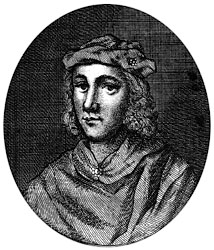
Constantine, son of Áed was an early King of Scotland, known then by the Gaelic name Alba. The Kingdom of Alba, a name which first appears in Constantine's lifetime, was situated in modern-day Scotland.
Old English literature, or Anglo-Saxon literature, encompasses literature written in Old English, in Anglo-Saxon England from the 7th century to the decades after the Norman Conquest of 1066. "Cædmon's Hymn", composed in the 7th century, according to Bede, is often considered as the oldest surviving poem in English. Poetry written in the mid-12th century represents some of the latest post-Norman examples of Old English; for example, The Soul's Address to the Body found in Worcester Cathedral Library MS F. 174 contains only one word of possible Latinate origin, while also maintaining a corrupt alliterative meter and Old English grammar and syntax, albeit in a degenerative state. The Peterborough Chronicle can also be considered a late-period text, continuing into the 12th century. The strict adherence to the grammatical rules of Old English is largely inconsistent in 12th century work – as is evident in the works cited above – and by the 13th century the grammar and syntax of Old English had almost completely deteriorated, giving way to the much larger Middle English corpus of literature.
Old English, or Anglo-Saxon, is the earliest recorded form of the English language, spoken in England and southern and eastern Scotland in the early Middle Ages. It was brought to Great Britain by Anglo-Saxon settlers in the mid-5th century, and the first Old English literary works date from the mid-7th century. After the Norman conquest of 1066, English was replaced, for a time, as the language of the upper classes by Anglo-Norman, a relative of French. This is regarded as marking the end of the Old English era, as during this period the English language was heavily influenced by Anglo-Norman, developing into a phase known now as Middle English.
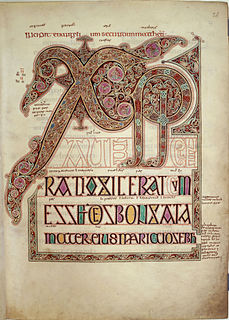
The Anglo-Saxons were a cultural group who inhabited England from the 5th century. They comprised people from Germanic tribes who migrated to the island from continental Europe, their descendants, and indigenous British groups who adopted many aspects of Anglo-Saxon culture and language. The Anglo-Saxons established the Kingdom of England, and the modern English language owes almost half of its words – including the most common words of everyday speech – to their language.

British Israelism is a pseudoarchaeological belief that the people of the British Isles are "genetically, racially, and linguistically the direct descendants" of the Ten Lost Tribes of ancient Israel. With roots in the 16th century, British Israelism was inspired by several 19th century English writings such as John Wilson's 1840 Our Israelitish Origin. Numerous British Israelite organisations were set up throughout the British Empire as well as in America from the 1870s onwards; a number of these organisations are independently active as of the early 21st century. In America, the idea gave rise to the Christian Identity movement.

The Norsemen were a North Germanic ethnolinguistic group of the Early Middle Ages, during which they spoke the Old Norse language. The language belongs to the North Germanic branch of the Indo-European languages and is the predecessor of the modern Germanic languages of Scandinavia. During the late 8th century, Norsemen embarked on a large-scale expansion in all directions, giving rise to the Viking Age. In English-language scholarship since the 19th century, Norse seafaring traders, settlers and warriors have commonly been referred to as Vikings. The identity of Norsemen derived into their modern descendants, the Danes, Icelanders, Faroe Islanders, Norwegians, and Swedes, who are now generally referred to as 'Scandinavians' rather than Norsemen.
Solomon and Saturn is the generic name given to four Old English works, which present a dialogue of riddles between Solomon, the king of Israel, and Saturn, identified in two of the poems as a prince of the Chaldeans.

Runes are the letters in a set of related alphabets known as runic alphabets, which were used to write various Germanic languages before the adoption of the Latin alphabet and for specialised purposes thereafter. The Scandinavian variants are also known as futhark or fuþark ; the Anglo-Saxon variant is futhorc or fuþorc.

Germanic paganism refers to the religion practiced by the Germanic peoples from the Iron Age until Christianisation during the Middle Ages. It was an essential element of early Germanic culture. From both archaeological remains and literary sources, it is possible to trace a number of common or closely related beliefs amid the Germanic peoples into the Middle Ages, when the last areas in Scandinavia were Christianized. Rooted in Proto-Indo-European religion, Proto-Germanic religion expanded during the Migration Period, yielding extensions such as Old Norse religion among the North Germanic peoples, the paganism practiced amid the continental Germanic peoples, and Anglo-Saxon paganism among the Old English-speaking peoples. The Germanic religion is best documented in several texts from the 10th and 11th centuries, where they have been best preserved in Scandinavia and Iceland.

The Armanen runes are a series of 18 runes, closely based on the historical Younger Futhark, introduced by Austrian mysticist and Germanic revivalist Guido von List in his Das Geheimnis der Runen, published as a periodical article in 1906, and as a standalone publication in 1908. The name Armanen runes associates the runes with the postulated Armanen, whom von List saw as ancient Aryan priest-kings.
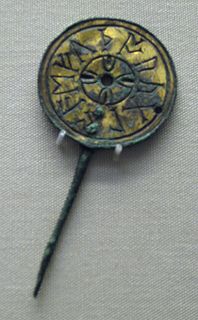
Anglo-Saxon runes are runes used by the early Anglo-Saxons as an alphabet in their writing system. The characters are known collectively as the futhorc (fuþorc), from the Old English sound values of the first six runes. The futhorc was a development from the 24-character Elder Futhark. Since the futhorc runes are thought to have first been used in Frisia before the Anglo-Saxon settlement of Britain, they have also been called Anglo-Frisian runes. They were likely used from the 5th century onward, recording Old English and Old Frisian.

The Cornish people or Cornish are a Celtic ethnic group and nation native to, or associated with Cornwall and a recognised national minority in the United Kingdom, which can trace its roots to the ancient Britons who inhabited southern and central Great Britain before the Roman conquest. Many in Cornwall today continue to assert a distinct identity separate from or in addition to English or British identities. Cornish identity has been adopted by migrants into Cornwall, as well as by emigrant and descendant communities from Cornwall, the latter sometimes referred to as the Cornish diaspora. Although not included as an explicit option in the UK census, the numbers of those claiming Cornish ethnic and national identity are officially recognised and recorded.
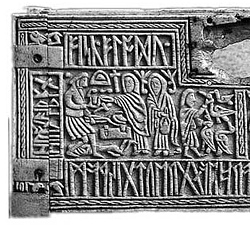
Anglo-Saxon paganism, sometimes termed Anglo-Saxon heathenism, Anglo-Saxon pre-Christian religion, or Anglo-Saxon traditional religion, refers to the religious beliefs and practices followed by the Anglo-Saxons between the 5th and 8th centuries AD, during the initial period of Early Medieval England. A variant of Germanic paganism found across much of north-western Europe, it encompassed a heterogeneous variety of beliefs and cultic practices, with much regional variation.
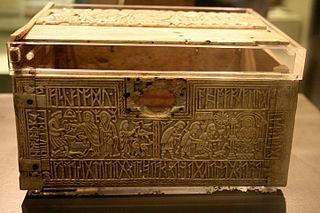
The Franks Casket is a small Anglo-Saxon whale's bone chest from the early 8th century, now in the British Museum. The casket is densely decorated with knife-cut narrative scenes in flat two-dimensional low-relief and with inscriptions mostly in Anglo-Saxon runes. Generally reckoned to be of Northumbrian origin, it is of unique importance for the insight it gives into early Anglo-Saxon art and culture. Both identifying the images and interpreting the runic inscriptions has generated a considerable amount of scholarship.
Alberht was an eighth-century ruler of the kingdom of East Anglia. He shared the kingdom with Beonna and possibly Hun, who may not have existed. He may still have been king in around 760. He is recorded by the Fitzwilliam Museum and the historian Simon Keynes as Æthelberht I.

The English people are an ethnic group and a nation native to England, who speak the English language of the Indo-European language family and share a common history and culture. The English identity is of early medieval origin, when they were known in Old English as the Angelcynn. Their ethnonym is derived from the Angles, one of the Germanic peoples who migrated to Great Britain around the 5th century AD. England is the largest and most populous country of the United Kingdom of Great Britain and Northern Ireland.
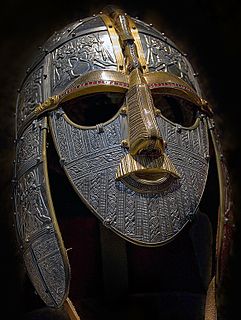
The Anglo-Saxon settlement of Britain is the process which changed the language and culture of most of what became England from Romano-British to Germanic. The Germanic-speakers in Britain, themselves of diverse origins, eventually developed a common cultural identity as Anglo-Saxons. This process principally occurred from the mid-fifth to early seventh centuries, following the end of Roman rule in Britain around the year 410. The settlement was followed by the establishment of Anglo-Saxon kingdoms in the south and east of Britain, later followed by the rest of modern England, and the south-east of modern Scotland.
Timothy Patrick Bragg is an English author and musician who has worked in politics. He was a founder member of the cultural publication Steadfast. He has been a vegetarian since late childhood. Currently he is perhaps best known as being a drummer/percussionist.
The "Finnesburg Fragment" is a portion of an Old English heroic poem about a fight in which Hnæf and his 60 retainers are besieged at "Finn's fort" and attempt to hold off their attackers. The surviving text is tantalisingly brief and allusive, but comparison with other references in Old English poetry, notably Beowulf, suggests that it deals with a conflict between Danes and Frisians in Migration-Age Frisia.
Stephen Pollington is an English author who specialises in Anglo-Saxon England and the Old English language who has written a number of books on the subject, most of which have been published by the company Anglo-Saxon Books.
References
- ↑ "A step closer to ancient England - Wyoming Tribune Eagle Online" . Retrieved 2010-05-24.
- 1 2 Linsell, Tony (2005). Views from the English Community. King's Lynn: Athelney. p. 10. ISBN 1-903313-03-1. OCLC 61301686.
- ↑ "Consultations, Legislation and Documents - Campaign for an English Parliament" . Retrieved 2010-05-24.
- ↑ "Steadfast Trust website" . Retrieved 2012-03-15.
- ↑ "Episode 2". White Tribe. Series 2. 20 January 2000. Channel 4.
- ↑ "Progress for the English Community". Archived from the original on May 1, 2009. Retrieved 2010-05-24.CS1 maint: unfit url (link)
- ↑ Medhurst, Andy (2007). A National Joke: Popular Comedy and English Cultural Identities. London: Routledge. p. 55. ISBN 978-0-415-16877-9. OCLC 104869272.
| This article about an English politician is a stub. You can help Wikipedia by expanding it. |
| This article about an English writer, poet or playwright is a stub. You can help Wikipedia by expanding it. |